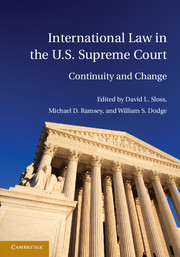Book contents
- Frontmatter
- Contents
- List of Contributors
- Table of Cases
- Acknowledgments
- Introduction
- PART I FROM THE FOUNDING TO THE CIVIL WAR
- PART II FROM THE CIVIL WAR TO THE TURN OF THE CENTURY
- PART III FROM THE TURN OF THE CENTURY TO WORLD WAR II
- PART IV FROM WORLD WAR II TO THE NEW MILLENNIUM
- PART V INTERNATIONAL LAW IN THE U.S. SUPREME COURT IN THE TWENTY-FIRST CENTURY
- V.A TREATIES AFTER 2000
- V.B CUSTOMARY INTERNATIONAL LAW AFTER 2000
- Main Essay – Sosa and the Derivation of Customary International Law
- Response Essay – “Cheap Talk” about Customary International Law
- Response Essay – History, Ideology, and Erie v. Tompkins
- V.C INTERNATIONAL LAW AND CONSTITUTIONAL INTERPRETATION AFTER 2000
- V.D INTERNATIONAL LAW AND STATUTORY INTERPRETATION AFTER 2000
- V.E INTERNATIONAL LAW AND THE WAR ON TERROR
- VI CONCLUSION
- Index
Response Essay – “Cheap Talk” about Customary International Law
Published online by Cambridge University Press: 05 July 2011
- Frontmatter
- Contents
- List of Contributors
- Table of Cases
- Acknowledgments
- Introduction
- PART I FROM THE FOUNDING TO THE CIVIL WAR
- PART II FROM THE CIVIL WAR TO THE TURN OF THE CENTURY
- PART III FROM THE TURN OF THE CENTURY TO WORLD WAR II
- PART IV FROM WORLD WAR II TO THE NEW MILLENNIUM
- PART V INTERNATIONAL LAW IN THE U.S. SUPREME COURT IN THE TWENTY-FIRST CENTURY
- V.A TREATIES AFTER 2000
- V.B CUSTOMARY INTERNATIONAL LAW AFTER 2000
- Main Essay – Sosa and the Derivation of Customary International Law
- Response Essay – “Cheap Talk” about Customary International Law
- Response Essay – History, Ideology, and Erie v. Tompkins
- V.C INTERNATIONAL LAW AND CONSTITUTIONAL INTERPRETATION AFTER 2000
- V.D INTERNATIONAL LAW AND STATUTORY INTERPRETATION AFTER 2000
- V.E INTERNATIONAL LAW AND THE WAR ON TERROR
- VI CONCLUSION
- Index
Summary
In his comment on Sosa v. Alvarez-Machain, Professor Edward Purcell characterizes Erie Railroad Co. v. Tompkins as “a kind of jurisprudential Rorschach test, a device that reveals the political goals and values of those who seek to use it.” The same can be said of Sosa itself.
When Professor John McGinnis looks at Sosa, he sees an “astringently positivist” approach to the identification of customary international law. In his view, Sosa confirms the errancy of scholars who find customary international law status for “substantial human rights norms” that can then be applied in U.S. domestic law. These scholars err because “instead of requiring that nation-states actually engage in a practice, they substitute statements by nation-states that give the norms verbal endorsement – often at high levels of generality,” such as UN General Assembly Resolutions. Although Professor McGinnis does not specifically mention treaties, others who share his general view of Sosa have – Professors Curtis Bradley, Jack Goldsmith, and David Moore, for example.
According to this “positivist” critique, “publicists' theories and international court judgments are useful [for identifying the content of customary international law] only if they provide evidence of a norm from actual state practice.” Proponents of this critique define “actual state practice” narrowly to include only what states do, not what they say. In this perspective, all talk is “cheap talk,” and the fact that such talk is engaged in by sovereigns does not make it a “sovereign act[]” capable of “ground[ing]” a customary international law norm that can be applied in U.S. law.
- Type
- Chapter
- Information
- International Law in the U.S. Supreme Court , pp. 494 - 498Publisher: Cambridge University PressPrint publication year: 2011



